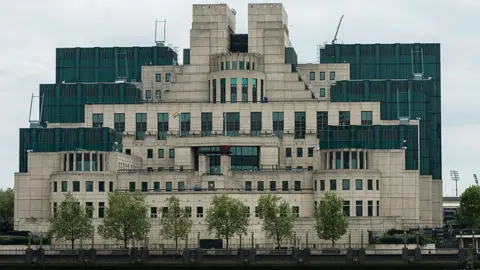MI6 chief apologises for past ban on LGBT staff
 Getty Images
Getty ImagesThe chief of the Secret Intelligence Service, also known as MI6, has publicly apologised for its historic treatment of LGBT people.
Richard Moore said a security bar on LGBT staff until 1991 had been "wrong, unjust and discriminatory".
In a video posted on Twitter 30 years after the ban was lifted, he said it had also been counter-productive.
MI6 "deprived ourselves of some of the best talent Britain could offer", he said.
The MI6 chief has chosen LGBT History Month to offer both praise and contrition to those who were wronged by the ban.
Mr Moore, who is the only publicly identifiable member of MI6, said thousands of patriotic people were wrongly denied the chance to work in intelligence.
"The ban did mean that we, in the intelligence and diplomatic services, deprived ourselves of some of the best talent Britain could offer. Ready to serve but denied that opportunity," he said.
Same-sex relationships were decriminalised in Britain in 1967, but it took a further 24 years before the ban on hiring LGBT staff across government was lifted.
Before then it was wrongly thought that they would be vulnerable to blackmail and subversion, Mr Moore said.
LGBT people who declared their sexual orientation at that time were asked to leave government service. Thousands more who wanted to join were prevented from doing so.
"Committed, talented, public-spirited people had their careers and lives blighted because it was argued that being LGBT+ was incompatible with being an intelligence professional," Mr Moore said.
"Because of this policy, other loyal and patriotic people had their dreams of serving their country in MI6 shattered. This was wrong, unjust and discriminatory."
Allow X content?

The MI6 chief, who rarely makes any public statement, used his official Twitter account to broadcast his message.
In a separate video, Mr Moore thanked all LGBT staff for their contribution to Britain's security as he appeared alongside the actor Sir Ian McKellen, who recalled some of the homophobic discrimination he had encountered in the 1980s.
Sir Ian suggested the lifting of the ban in 1991 put MI6 in the "vanguard" and helped change the way society thought about LGBT people.
"Having so boldly accepted there had been injustice in the past within its own organisation, it gave heart for people to think 'well, perhaps you could spread that principle of honesty and equality to other areas of life'," he said.
Foreign Secretary Dominic Raab, who has ministerial responsibility for MI6, also paid tribute to the courage of LGBT colleagues, past and present, saying the UK was safer because of their dedicated service.
